

Science. Steven Pinker: Linguistics as a Window to Understanding the Brain. Steven Pinker – Psychologist, Cognitive Scientist, and Linguist at Harvard University How did humans acquire language?
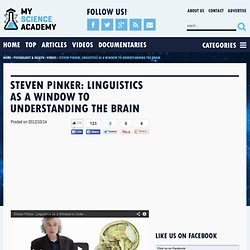
In this lecture, best-selling author Steven Pinker introduces you to linguistics, the evolution of spoken language, and the debate over the existence of an innate universal grammar. He also explores why language is such a fundamental part of social relationships, human biology, and human evolution. Finally, Pinker touches on the wide variety of applications for linguistics, from improving how we teach reading and writing to how we interpret law, politics, and literature. The Floating University Originally released September, 2011. Additional Lectures: Michio Kaku: The Universe in a Nutshell Joel Cohen: Joel Cohen: An Introduction to Demography (Malthus Miffed: Are People the Problem?) Ernesto Sirolli: Want to help someone? Shut up and listen!
10 Underrated YouTubers. Rhetological Fallacies. A brain-blending categorisation and visualisation of errors and manipulations of rhetoric and logical thinking.
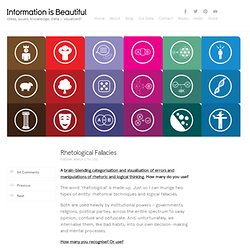
How many do you use? The word ‘rhetological’ is made up. Just so I can munge two types of entity: rhetorical techniques and logical fallacies. Sam Harris - Conceptos erroneos sobre el ateismo (subtitulado) Neuro. How Common Is Life in the Universe. There almost certainly is life elsewhere in the universe.
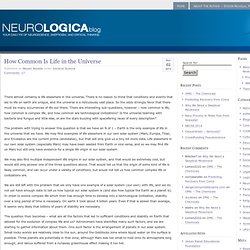
There is no reason to think that conditions and events that led to life on earth are unique, and the universe is a ridiculously vast place. So the odds strongly favor that there must be many occurrences of life out there. There are interesting sub-questions, however – how common is life, how common is complex life, and how common are technological civilizations? Is the universe teaming with bacteria and fungus and little else, or are the stars buzzing with spacefaring races of every description? The problem with trying to answer this question is that we have an N of 1 – Earth is the only example of life in the universe that we have.
We may also find multiple independent life origins in our solar system, and that would be extremely cool, but would still only answer one of the three questions above. Large gas giants (Jovian planets) are farther out. The location of the gas giants seems to be important. But I may be wrong. ¿Son la cuántica y la relatividad incompatibles? En esta entrada, Carlos sugiere dedicar un artículo a la “incompatibilidad” de la relatividad general y la mecánica cuántica.
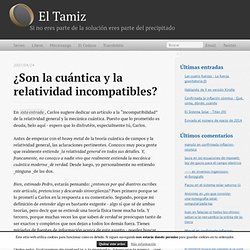
Puesto que lo prometido es deuda, helo aquí - espero que lo disfrutéis, especialmente tú, Carlos. Antes de empezar con el heavy metal de la teoría cuántica de campos y la relatividad general, las aclaraciones pertinentes. Conozco muy poca gente que realmente entienda _la relatividad general en todos sus detalles. Y, francamente, no conozco a nadie vivo que realmente entienda la mecánica cuántica moderna _de verdad.
Noam Chomsky on Where Artificial Intelligence Went Wrong - Yarden Katz. An extended conversation with the legendary linguist Graham Gordon Ramsay If one were to rank a list of civilization's greatest and most elusive intellectual challenges, the problem of "decoding" ourselves -- understanding the inner workings of our minds and our brains, and how the architecture of these elements is encoded in our genome -- would surely be at the top.

Yet the diverse fields that took on this challenge, from philosophy and psychology to computer science and neuroscience, have been fraught with disagreement about the right approach. In 1956, the computer scientist John McCarthy coined the term "Artificial Intelligence" (AI) to describe the study of intelligence by implementing its essential features on a computer. Instantiating an intelligent system using man-made hardware, rather than our own "biological hardware" of cells and tissues, would show ultimate understanding, and have obvious practical applications in the creation of intelligent devices or even robots. Yarden Katz. Neurodidactica88's Collections. Neurosciences.
Carpeta de 4shared - Investigacion y ciencia. Files Photo Music Books Video Games Sign Up Log In Forgot password?

Login with: PremiumLanguageen FAQ Help Report abuse Investigacion y ciencia. Thomas Kuhn: the man who changed the way the world looked at science. Fifty years ago this month, one of the most influential books of the 20th century was published by the University of Chicago Press.
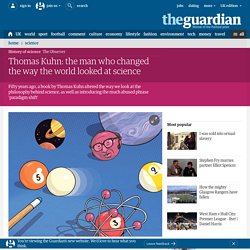
Many if not most lay people have probably never heard of its author, Thomas Kuhn, or of his book, The Structure of Scientific Revolutions, but their thinking has almost certainly been influenced by his ideas. The litmus test is whether you've ever heard or used the term "paradigm shift", which is probably the most used – and abused – term in contemporary discussions of organisational change and intellectual progress. A Google search for it returns more than 10 million hits, for example. And it currently turns up inside no fewer than 18,300 of the books marketed by Amazon. It is also one of the most cited academic books of all time. Kuhn's version of how science develops differed dramatically from the Whig version. Biohumanities/podcasts/humannature_podcast.html. Revista Argentina de Ciencias del Comportamiento.
Intro to AI - Introduction to Artificial Intelligence - Oct-Dec 2011. Anatomy of a false memory – Neurophilosophy. WE BELIEVE THAT memory provides us with a faithful record of past events.
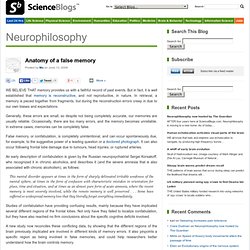
But in fact, it is well established that memory is reconstructive, and not reproductive, in nature. In retrieval, a memory is pieced together from fragments, but during the reconstruction errors creep in due to our own biases and expectations. Programa Redes. Neuroscience.